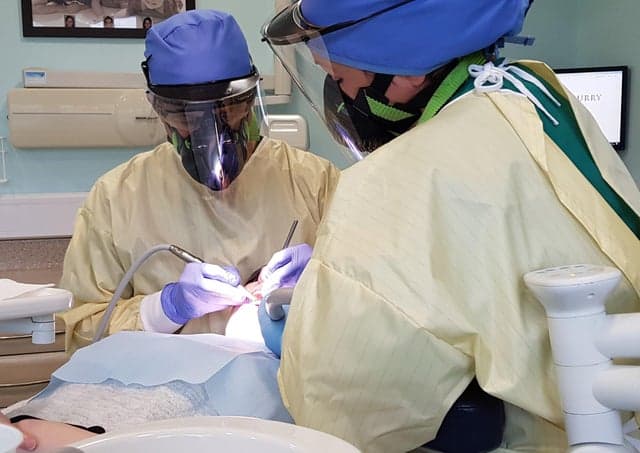Consider Your Dental Professionals During COVID-19…
In the ‘before times,’ as people are now calling the period before COVID-19, dentists were already managing a highly demanding profession with significant mental health stressors. In fact, dentists have one of the highest rates of depression and suicide amongst health workers. The rate of suicide among dentists in the United States is twice that of the general population and three times higher than other healthcare professions.
Now, with COVID-19, dentists are largely forgotten in the panoply of health providers working during the pandemic. They’ve been forgotten as both business owners with a high overhead to maintain their practices and safeguard their staff, and as front-line workers, who do essential and potentially life-endangering work requiring personal protective equipment (PPE).
This has meant the stress of dentists is at an all time high.
If our dentists are stressed, it’s likely not good for our oral health. Research shows that patient care is directly related to practitioner health. So, what makes dentistry so stressful?
Research demonstrates that dentists can internalize their patients’ fears and anxieties related to dental care. They also commonly work in small teams and can feel isolated. With the scarcity of networks of colleagues and mentors who have a buffering effect through the support they provide in other professions, dentists might perceive themselves as working in a vacuum, which can be detrimental for their mental health.
Dentists are also usually self-employed business owners with responsibilities related to staffing and financial management. This can impede work-life balance and make taking time off to practice self-care or manage potential mental health challenges, particularly extended leaves of absence, difficult.
The COVID-19 pandemic and related closures have added to this complexity.
Like many other business owners, dentists were faced with additional pressures resulting from prolonged office closures and reduced patient flow, which led to staff layoffs and significant revenue losses. Dental offices that remained open during the pandemic restricted their treatment to emergency and urgent cases only and had to develop protocols for the increased burden of disinfection and sterilization practices.
Although they haven’t been considered frontline workers, many dentists also had to manage dental emergencies that, if left untreated, had the potential to develop into serious, life-threatening conditions. Working during a pandemic means worrying about contracting COVID yourself — and possibly bringing it home to your family.
Dentists from all across Canada expressed the need for direction and strong leadership from their regulatory bodies and associations to weather the storm and be able to practice dentistry in a manner that protects their patients, staff and themselves. At the beginning of the crisis, there was a call for enhanced PPE, which was hard to come by. PPE is also hard to work in and may add some discomfort imposed by the extra equipment.
Although months have passed since the “acute” phase of the pandemic has started, dentists are still concerned about securing adequate PPE, with some charging additional fees to cover their PPE expenditures.
There are initiatives that can help combat dentists’ stress.
Expanded peer mentorship and support programs in dental schools and the dental community would be a critical first step. These programs should be undertaken by dental educators and dental associations and employ proactive approaches that support mental health and wellbeing.
Organized peer support programs could build on existing, small-scale initiatives, such as the British Columbia Dental Association’s (BCDA) Dentist Wellness Program (DWP), where clinical counseling services are offered to dentists and their family members.
Governments should also help to facilitate the acquisition of adequate PPE supplies to dentists, as they have to physicians and nurses, now that dental care has resumed, and dentists are back to practicing.
It’s important that we safeguard our dentists’ mental health and well being as they work on the front lines to keep Canadians healthy. Let’s make sure they are no longer the forgotten health profession.
Authors: Tala Maragha and Mario Brondani
Article originally appeared at: https://quoimedia.com/
